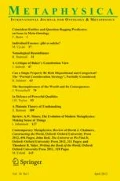Abstract
In this paper I will offer a novel understanding of a priori knowledge. My claim is that the sharp distinction that is usually made between a priori and a posteriori knowledge is groundless. It will be argued that a plausible understanding of a priori and a posteriori knowledge has to acknowledge that they are in a constant bootstrapping relationship. It is also crucial that we distinguish between a priori propositions that hold in the actual world and merely possible, non-actual a priori propositions, as we will see when considering cases like Euclidean geometry. Furthermore, contrary to what Kripke seems to suggest, a priori knowledge is intimately connected with metaphysical modality, indeed, grounded in it. The task of a priori reasoning, according to this account, is to delimit the space of metaphysically possible worlds in order for us to be able to determine what is actual.
Similar content being viewed by others
Notes
An ‘a priori proposition’ being any proposition that was reached by a priori means. The validity of the proposition simply means that the reasoning process that led to it is consistent and does not violate the laws of logic, i.e. that human error is ruled out and we have no reasons to suspect its feasibility.
Friedman’s (2000) account, for instance, is a good attempt at this.
MacBride, F., ‘Ontological Categories: A priori or A posteriori?’, delivered at the Conference On Methodological Issues In Contemporary Metaphysics, 6–7 January 2006, Nottingham.
For the time being, I will leave the case of necessary (non-analytic) a priori truths aside, but they will be discussed briefly later on. However, analytic a priori propositions are not my concern here.
The fifth postulate states that if two lines intersect a third so that the sum of the interior angles on one side is less than two right angles, then the two straight lines, if extended indefinitely, must intersect on the side on which the sum of the angles is less than two right angles.
Or, perhaps more plausibly, geometry altogether is not a priori, but the point stands.
For a more detailed discussion of Euclid’s postulates with at least partly similar sentiments, see BonJour (1998, Appendix).
If we did want a genuine chess-related example of a priori reasoning, we should perhaps look at the invention of chess. However, very little is known of it.
Or at least the law of minimal contradiction, i.e. not every statement is both true and false (cf. Putnam 1978).
Possibly also with the help of, say, a computer, as Kripke (1980, 35) has suggested.
See Lowe (1998) for an extensive explanation of why possibility precedes actuality.
References
Bealer, G. (2000) ‘A Theory of the A Priori’, Pacific Philosophical Quarterly 81: 1–30.
BonJour, L. (1998) In Defense of Pure Reason: A Rationalist Account of A Priori Justification (Cambridge: Cambridge University Press).
Field, H. (2000) ‘Apriority as an Evaluative Notion’, in Boghossian & Peacocke 2000: 117–149.
Fine, K. (1994) ‘Essence and Modality’, J. E. Tomberlin (ed.), Philosophical Perspectives, 8: Logic and Language (Atascadero, CA: Ridgeview), pp. 1–16.
Friedman, M. (2000) ‘Transcendental Philosophy and A Priori Knowledge: A Neo-Kantian Perspective, in Boghossian & Peacocke 2000: 367–383.
Hughes, C. (2004) Kripke: Names, Necessity, and Identity (Oxford: Oxford University Press).
Kripke, S. (1980) Naming and Necessity (Cambridge, Mass.: Harvard University Press).
Lowe, E. J. (1998) The Possibility of Metaphysics (Oxford: Oxford University Press).
Peacocke, C. (2000) ‘Explaining the A Priori: The Programme of Moderate Rationalism’, in Boghossian & Peacocke 2000: 255–285.
Peacocke, C. (2004) The Realm of Reason (Oxford: Clarendon Press).
Putnam, H. (1978) ‘There Is At Least One A Priori Truth’, Erkenntnis 13: 153–70, reprinted in Realism and Reason (1983) (Cambridge: Cambridge University Press).
Quine, W. V. (1951) ‘Two Dogmas of Empiricism’, The Philosophical Review 60: 20–43, reprinted in From a Logical Point of View (1961), 2nd edn. (Cambridge, Mass: Harvard University Press).
Author information
Authors and Affiliations
Corresponding author
About this article
Cite this article
Tahko, T.E. A New Definition of A Priori Knowledge: In Search of a Modal Basis. Int Ontology Metaphysics 9, 57–68 (2008). https://doi.org/10.1007/s12133-007-0022-7
Received:
Accepted:
Published:
Issue Date:
DOI: https://doi.org/10.1007/s12133-007-0022-7




